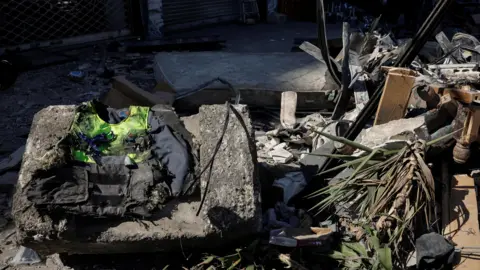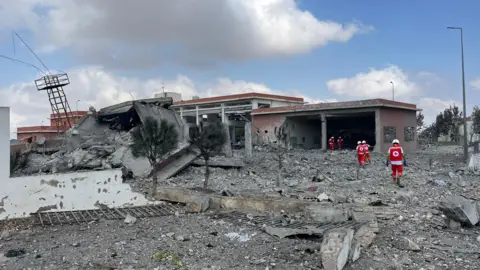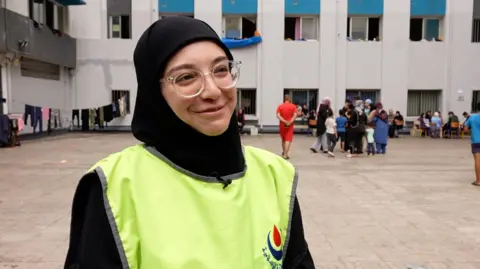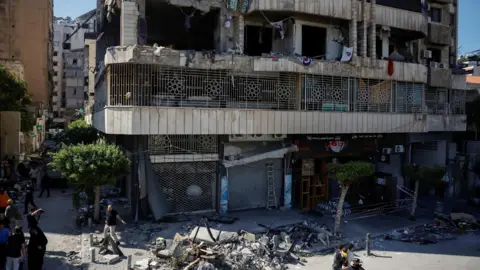Lebanon’s emergency workers pay a deadly price amid Israeli bombing
 Reuters
ReutersThe Israeli military has been hitting search-and-rescue teams, medical centres and hospitals across Lebanon since it escalated its offensive against Hezbollah last month.
The attacks have killed and injured dozens of medics and emergency workers and have left swathes of the south cut off from emergency services and healthcare.
One organisation has been hit more than any other. The Islamic Health Society (IHS), funded by Hezbollah, operates emergency services, hospitals and medical centres across the country.
As of Friday, more than 85 of its staff had been killed, and more than 150 wounded, according to Bilal Assaf, head of media relations at the IHS Civil Defence.
Just after midnight on 7 October, Israel struck the Baraachit Emergency Centre in the southern Bint Jbeil region, killing at least 10 firefighters, according to the Lebanese health ministry.
In the hours before the attack, the firefighters in Baraachit - part of the IHS Civil Defence emergency services - were grappling with a grim dilemma.
There were still civilians in the area – including some who refused to leave - but Israeli forces were no longer allowing the team to conduct missions.
“Every time they went out, they would hit near their vehicle,” says Mr Assaf.
The firefighters decided to split up; some would head north to Nabatiyeh, and others would stay and reassess whether to relocate in the morning.
“Unfortunately, they didn’t live to see the next morning,” Mr Assaf says.
In the early hours of Monday, an Israeli air strike destroyed the building where they were staying.
The Lebanese health ministry denounced the strike as a “massacre”.
In a statement, it said: “The Israeli enemy has added to its rich record a new war crime against firefighters and rescue workers in south Lebanon, displaying unmatched violence and lack of humanity, targeting people engaged in purely humanitarian search and rescue missions.”
A few hours after the attack, the Lebanese Red Cross went to the site and found eight bodies.
There were more under the rubble, but it could not remove them because search and rescue teams could not make it to the site, according to Mr Assaf.
Days after the attack, he tells me, the remains of several firefighters are still under the debris.
 The Islamic Health Society
The Islamic Health Society As Lebanon struggles with a mass displacement crisis caused by Israeli strikes across large parts of the country, IHS medics and volunteers are offering support to the people affected – alongside the government and other organisations.
In one of many schools in Beirut which have become shelters, hundreds of people who have fled Israeli bombing on the south and the southern suburbs of Beirut try to make themselves at home.
Clothes hang out to dry from the windows of the classrooms overlooking the playground; faces - some bored, some curious - take the occasional glance at the scene unfolding below and disappear back to their bedrooms.
Down in the schoolyard, children play around, some with bicycles, others with footballs.
A few young men gather around our camera, complaining about water shortages. Some of the adults take drags on their shishas, a popular pastime suited for a long and uncertain wait.
Overhead, the constant hum of an Israeli drone - a new normal all over Beirut.
'Everyone knows someone who was martyred'
Ali Freidi, who runs the health centres of the IHS, tells me they have deployed doctors, nurses, therapists and psychiatrists to help the growing mass of displaced people.
He acknowledges the immense pressure the IHS's services were under, both in dealing with the growing needs of the displaced, as well as Israel’s strikes on their colleagues in the emergency services.
“We are part of the fabric of society,” he says. “Everyone knows someone who was martyred.”
Batoul Hammoud, 25, is a school teacher and a volunteer with the IHS Civil Defence.
She says she and her fellow volunteers have been going around the school - and another one across the street - to try to figure out how they can help.
“The most pressing need is medicine. Many people left their homes without taking their medicine.”
The IHS offers routine daily services, such as monitoring the blood pressure of the many elderly among the displaced, she says.
“As a teacher, I can also offer some psychological support for the kids, organise some activities, or just talk to them and calm them down.”

The IHS emerged in the early 1980s; amidst a civil war, an Israeli occupation of the south, and a breakdown of the state across Lebanon.
It was later licensed by the government, and currently operates in co-ordination with the Ministry of Health.
It also has agreements with municipalities to run medical centres and emergency services.
As the health service comes under intense fire across the country, it has taken more hits than any other health organisation.
On 3 October, Israel struck a centre belonging to the IHS in the heart of Beirut, killing nine people and wounding 14.
 Reuters
ReutersMost of those killed were civil defence workers and paramedics, who were just back from a search-and-rescue mission in the southern suburbs, where there had been heavy Israeli bombardment.
The next day, seven medics were killed in an Israeli air strike on two IHS ambulances near the entrance to Marjaiyoun hospital, in the south of the country. The hospital went out of service on that day.
Also that day Israeli forces struck the IHS-run Salah Ghandour Hospital in Bint Jbeil, wounding several doctors and hospital staff. The hospital suspended operations following the attack.
The director of the hospital, Dr Mohamad Sleiman, told me the hospital was functioning well until the last day, despite the war raging around it.
“We had medicine and equipment. The government plan was working well. We had no shortages the day of the accident. We just need safety,” he said.
'Who among us won't be here tomorrow?'
The Israeli military has issued several statements accusing Hezbollah of using medical vehicles to transport fighters and weapons.
It described its attack on the Baarachit Emergency Centre as a “precise, intelligence-based strike on several Hezbollah terrorist operatives who were using a fire station as a military post during combat”.
It also accused Hezbollah of “systematic abuse of civilian infrastructure”.
It said the strike on the HIS centre in central Beirut targeted “terror assets”.
And on Sunday, an Israeli military spokesman claimed that it had “discovered lately that Hezbollah elements are using ambulances to transport saboteurs and weapons”, and threatened it would take “the necessary measures against any vehicle transporting gunmen”, regardless of what type of vehicle it is.
Following the attack on the medical centre in Beirut, the EU’s foreign policy chief said: “Not only civilians are victims of attacks, including in densely populated areas, but they are deprived of emergency care. I condemn this violation [of International Humanitarian Law].”
Mr Assaf, the spokesman for the IHS Civil Defence, says the IHS plays no military role and accuses Israel of striking emergency services in areas where they want to force civilians out.
“Up until two weeks ago there were still some people in Bint Jbeil,” he says.
“Our presence reassured them to a certain extent. Our guys were taking care of them, even bringing them food.”
“Let’s assume for the sake of argument they’ve seen something with us [weapons], why are they hitting other emergency services?
On Friday, the UN said that over 100 medics and emergency workers had been killed in Lebanon since the start of the conflict between Hezbollah and Israel one year ago.
The World Health Organization said that since September 17, there had been 18 attacks on health facilities in Lebanon, killing 72 health workers.
The Lebanese health ministry has said that among the teams hit are the Islamic Risala Scout Association affiliated to the Amal party, an ally of Hezbollah, as well as the Lebanese Red Cross, and Lebanon’s official Civil Defence service, which is run by the interior ministry.
With the escalating attacks on emergency services, as well as the buildings housing the displaced, and crowded neighbourhoods in Beirut, many now see parallels between Israel’s onslaught in Lebanon and its year-long military campaign in Gaza.
Last week, a UN commission of inquiry said Israel was perpetrating “a concerted policy to destroy Gaza’s healthcare system”.
It accused Israel of “committing war crimes and the crime against humanity of extermination with relentless and deliberate attacks on medical personnel and facilities”. Israel rejected the commission’s findings.
While the carnage in Lebanon is still far from what Palestinians in Gaza have endured, many here fear it is only the beginning.
Among the IHS staff and volunteers, there is a mix of pain and defiance as they struggle to do their jobs under fire.
“At night when we gather to eat, we look at each other, wondering who among us won’t be here tomorrow,” Mr Assaf says.
I ask if he thinks they might have to suspend their operations in case the Israelis keep hitting them.
“They will definitely keep hitting us. We will definitely never stop.”
Mr Freidi, who runs the IHS medical centres, insists they “won’t leave the people”.
“These are our people who were forced to leave their land. We will serve them till our last breath.”
Ms Hammoud, the teacher and IHS volunteer, echoes these sentiments.
“It’s very hard, the targeting of these people who are helping others. These people should not be targeted.”
“What God decrees will happen,” she says with a smile.
“If God grants us martyrdom, then praise be to God. We will die as martyrs of the Civil Defence of the Islamic Health Society.”
